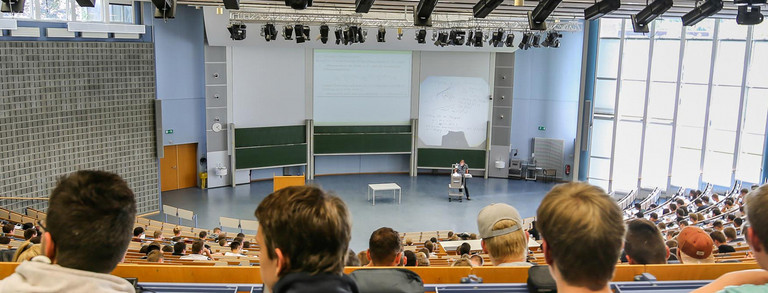Master (1 subject)
The International Master of Advanced Methods in Particle Physics (IMAPP) is a joint program of the University of Bologna (Italy), the University of Clermont Auvergne (France) and the TU Dortmund University (Germany), supported by internationally renowned partner institutions. The program focuses on experimental and theoretical particle physics.
to the degree program Advanced Methods in Particle Physics (Master of Science (M.Sc.))
The collective aging of our society is one of the most important individual and overall societal design tasks of our time. The Master’s degree program Ageing Societies enables students to recognize the existing and future challenges associated with an aging society and to explore and shape them on their own responsibility.
to the degree program Ageing Societies (Master of Arts (M.A.))
The Master's degree course in Applied Computer Science at TU Dortmund University offers an excellent opportunity to specialize further in this exciting field.
Students can set an individual study focus through numerous elective options.
to the degree program Applied Computer Sciences (Master of Science (M.Sc.))
The M.A. in Applied Linguistics is a research-based, bilingual program which qualifies students for professional activities that require deeper knowledge in this field. It goes beyond the training undertaken within the Bachelor’s degree program and teaches the ability for scientific work. This opens up further professional opportunities in higher education and scientific research. It is equally possible for students, having completed the Master’s degree program, to commence doctoral studies. Suitably qualified candidates who have already started their careers may also study for a Master’s degree.
to the degree program Applied Linguistics (Master of Arts (M.A.))
The research-oriented, bilingual Master’s degree program in Applied Literary and Cultural Studies qualifies students for fields of activity that require in-depth knowledge in the area of literary and cultural studies. In addition to the qualification of the Bachelor’s degree program, it provides the ability to work scientifically. This opens up further career opportunities in the university sector and at scientific research institutes.
to the degree program Applied Literary and Cultural Studies (Master of Arts (M.A.))
The consecutive Master’s program in Architecture and Urban Design forms the basis for a further academic qualification in teaching and research (doctoral studies) and is an excellent professional qualification for work in construction planning. The program teaches advanced technical, creative and scientific skills across the whole breadth of the subject as well as its intellectual foundations and also allows specialization in selected areas. Students can choose here between “Resource-efficient Construction” and “Urban Development”.
to the degree program Architecture and Urban Design (Master of Science (M.Sc.))
Continuing advances in automation and control technology make it a key enabler for ever more application areas in nearly all aspects of daily life. The Master’s degree program in Automation and Robotics provides the necessary fundamentals for a professional career in the information age fields of automation, control, and robotics.
to the degree program Automation and Robotics (Master of Science (M.Sc.))
Important facts about Master's programs (1-subject)
- The master's degree is the second qualifying university degree. As a rule, a bachelor's degree has already been successfully completed in advance.
- The standard period of study in the Master's program is at least one and at most two years.
- Depending on the course of study, TU Dortmund University awards the degrees Master of Science (M.Sc.) and Master of Arts (M.A.).
- Within the scope of the 1-subject Master's degree, you will study one course of study.
- The Master's degree enables you to pursue a doctorate.





![[Translate to English:] Partner Four hands are holding the green logo of TU Dortmund University](/storages/tu_website/_processed_/1/d/csm_Partner_Nicole_Rechmann_KW_670eba0154.jpg)




![[Translate to English:] Forschung An apparatus with tubes in a laboratory](/storages/tu_website/_processed_/0/c/csm_Forschung_Juergen_Huhn_4fa3153b51.jpg)
![[Translate to English:] Studium Five students are sitting in a lecture hall. They are talking to each other.](/storages/tu_website/_processed_/c/9/csm_Studium_FelixSchmale_dbdbfb0dd7.jpg)





